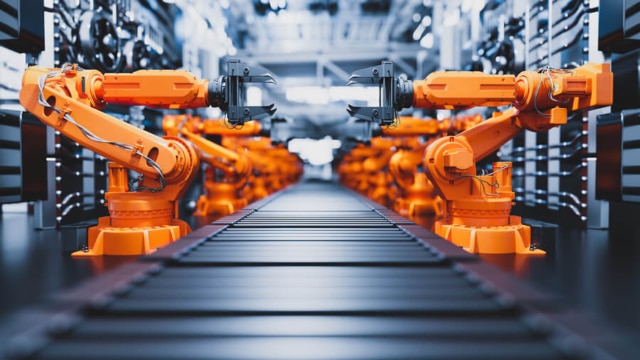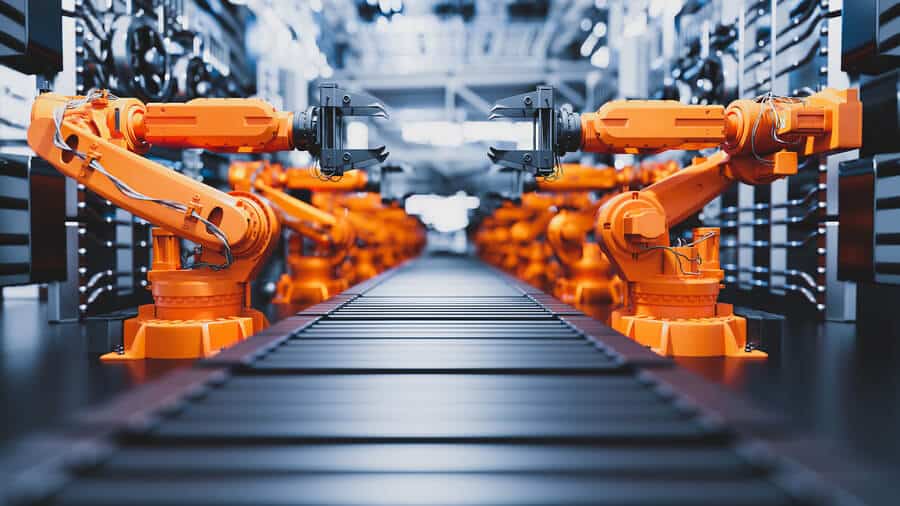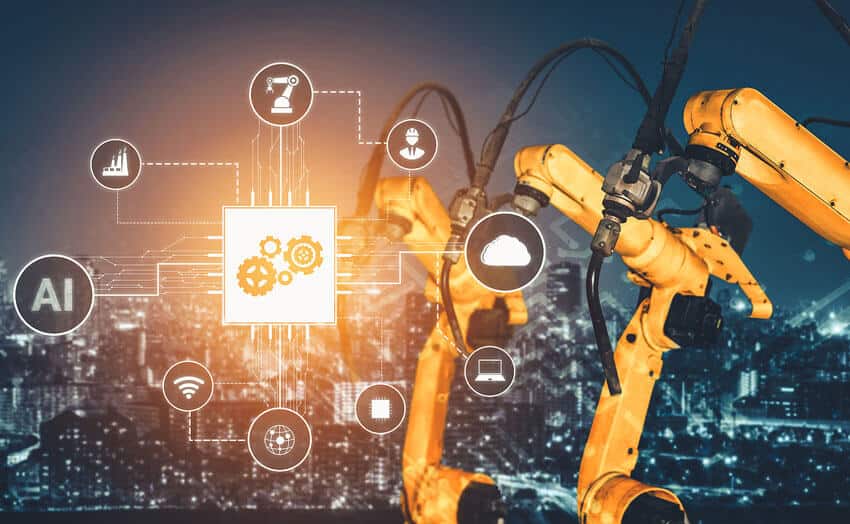The Impact of AI and Automation on Manufacturing HR Roles

May 28, 2025
Last updated on Nov 28, 2025
AI in human resources management is changing manufacturing from the factory floor to the front office. This shift creates a key moment for HR teams. They must learn to use AI's power for better efficiency, talent management, and business growth. For manufacturing leaders, the question isn't whether to adopt these tools—it's how fast they can use them before competitors pull ahead.

Key takeaways
- AI recruitment tools significantly reduce hiring costs while delivering substantial HR productivity gains through intelligent automation.
- Manufacturing automation creates opportunities for high-skilled roles while displacing low-skilled positions, requiring strategic workforce planning for future talent gaps.
- Leading manufacturers like Dell, IBM, and Siemens achieve major operational improvements through comprehensive AI integration across HR processes.
- The rapidly expanding AI in HR market makes early adoption essential for maintaining competitive advantage in manufacturing.
- Smart manufacturing initiatives now dominate improvement budgets for most manufacturing leaders, fundamentally changing talent requirements.
AI-driven applicant tracking systems are revolutionizing recruitment in manufacturing. They can rapidly sift through vast pools of resumes, assess qualifications, and even predict a candidate’s fit, significantly reducing manual screening time. This efficiency benefits both employers by filling positions faster and candidates by finding better-matched opportunities. Furthermore, AI can analyze historical data and market trends to predict future talent needs, allowing for proactive workforce planning and ensuring companies have the right skills in place. AI can also assess a candidate’s digital footprint to gauge potential cultural fit, leading to more holistic talent acquisition.
AI revolutionizes recruitment and talent acquisition in manufacturing
The scale of talent challenges in modern manufacturing demands solutions that traditional recruiting simply cannot deliver at the speed and precision required.
Modern manufacturing faces a tough talent challenge that old recruitment methods can’t solve. Finding people who can work with advanced robots, understand IoT systems, and adapt to changing production tech needs a new approach to hiring.
Core AI recruitment benefits include:
- Cost reduction: AI recruitment tools cut hiring costs
- Speed improvement: Dramatically reduced manual screening time
- Quality enhancement: Better candidate-job matching through data analysis
- Predictive capability: Forecast future skill demands using historical data
AI in HR processes now quickly sort through huge piles of resumes. They match candidates with the right job openings and cut manual screening time. This efficiency gain matters when the U.S. manufacturing sector expects 2.1 million unfilled jobs by 2030.
AI’s ability to predict goes beyond simple resume matching. By studying past data, machine learning helps manufacturing recruiting firms forecast which skills will be needed. This lets them plan ahead for talent needs. Autodesk shows this approach works well—they use AI to study candidate profiles and find the best fits for open jobs, cutting time-to-hire while improving new hire quality.
AI recruitment also checks cultural fit by looking at candidates’ online presence. This helps in HR in manufacturing settings where safety culture, ability to adapt to automation, and teamwork with both human and robot colleagues determine success.
AI supercharges HR productivity and operational efficiency
Real-world implementations across major manufacturers reveal productivity transformations that deliver measurable ROI within months of deployment.
Manufacturing HR departments see huge productivity changes through smart AI in human resources management use. HireVue reports 63% productivity gains from AI, with 55% successfully automating manual tasks and 52% improving overall business efficiency.
Dell automated 30 HR processes, resulting in HR productivity increases of up to 85% by removing routine work and letting teams focus on strategy. IBM’s automation of data collection for 15,000-17,000 employees during promotion cycles saved 12,000 hours in one quarter. Processing time dropped from 10 weeks to 5 weeks while ensuring faster and fairer promotions.
The efficiency gains cover many HR functions. Lenovo worked with HR management systems to automate tax declarations, expense payments, and payroll accounting. This saved 6,000 hours yearly for the HR team while letting employees submit expenses 90% faster than before.
Coca-Cola’s comprehensive approach shows the ultimate potential: HR audit automation across more than 50 processes in multiple SAP systems added 16 extra hours to every workday while achieving 100% audit coverage. These gains mirror the productivity improvements seen in manufacturing culture transformation initiatives.

Automation redefines workforce skills and job roles in manufacturing
Employment data reveals a complex but ultimately positive transformation where strategic workforce planning becomes the key differentiator between thriving and struggling manufacturers.
The employment impact varies by skill level:
- High-skilled roles: Positive growth in R&D and technical positions
- Low-skilled roles: Substitution effect on production, administrative, and financial staff
- Net impact: 134 million new jobs created vs. 101 million lost (2005-2015 Asia data)
Research studying Chinese manufacturing companies from 2012-2019 shows that automated machines have a replacement effect on total employment, with a coefficient of -0.1690. But the job impact varies greatly by skill level, creating strategic opportunities for smart leaders implementing HR trends in manufacturing industry practices.
As Ms. Ho Thi Kim Ngan, deputy head of the labour relations division of the Vietnam General Confederation of Labour, explains: “when cutting personnel, businesses will remove less skilled workers first and retain high-level ones who can work in many positions.”
Despite worries about job loss, broader economic analysis gives a more positive view. Asian Development Bank analysis shows automation and robotics created more jobs than they eliminated, with rising demand more than making up for jobs lost to technology.
Most in-demand skills for manufacturing include:
- Software development and network administration
- Data analysis and communications
- Mechanics, electronics, and automation
- Network security and cybersecurity
- Accounting, finance, and project management
Manufacturing leaders must prepare for a workforce that combines traditional manufacturing skills with digital knowledge, which are the skills that determine employee value in the next 5 years, according to data from the latest salary survey reports. This transformation requires leadership training for manufacturing supervisors to bridge the skills gap effectively.
AI empowers data-powered strategic HR management
The convergence of operational data and AI analytics creates unprecedented opportunities for strategic workforce decisions that directly impact manufacturing competitiveness and profitability.
Manufacturing companies generate huge amounts of operational data, creating opportunities for strategic AI in human resources management that were impossible before. Key data-driven HR capabilities:
- Workforce planning: Anticipate future staffing needs based on production forecasts
- Skills gap analysis: Identify training needs before they become critical shortages
- Performance optimization: Use real-time data to improve employee engagement
- Retention prediction: Identify at-risk employees before they leave
Manufacturing recruiting firms increasingly need to provide data-driven insights to clients about market trends and candidate availability. This changes the relationship from simple hiring support to strategic workforce consulting, similar to comprehensive HR consulting services that address broader organizational needs.
The prediction abilities of AI-powered HR analytics let manufacturing leaders anticipate workforce needs, identify potential retention risks, and optimize talent deployment across operations. This strategic advantage becomes particularly valuable when managing complex skill transitions and maintaining zero incident culture standards.

AI enhances employee development and onboarding processes
Advanced training technologies address manufacturing’s unique safety and complexity challenges while accelerating competency development and reducing costs simultaneously.
Employee development and onboarding in manufacturing face unique challenges due to complex machinery, safety requirements, and the integration of human workers with automated systems. AI in HR processes are changing these processes, delivering both safety improvements and cost reductions.
Siemens exemplifies this transformation by using AI to create virtual simulations that let new employees practice operating complex machinery in safe environments.
The virtual training approach addresses multiple strategic challenges at once. New employees gain confidence and skill without production disruption, safety risks are minimized during the learning process, and training consistency is maintained across different locations and shifts. These benefits become particularly valuable as manufacturing operations become more complex and integrated with AI-driven systems.
Organizations using AI-enhanced development programs should prioritize skills over headcount, preparing employees for AI integration by identifying and planning for AI-related skills and abilities. As Gartner recommends, HR leaders should work with IT, legal, and compliance teams to address accuracy, reliability, and transparency issues—often requiring compliance advisory services for proper implementation.
The strategic approach must emphasize continuous learning and adaptability, responding to the shift in employee expectations regarding career development. Workers should improve their skills to meet evolving job requirements, while companies should provide both short- and long-term training programs for increasingly automated manufacturing environments.
AI in human resources management integration is reshaping manufacturing HR, creating major opportunities for efficiency and strategic contribution. CEOs must lead this tech evolution by investing smartly in AI tools and complete workforce development programs to maintain competitive advantage. The CEO and HR relationship becomes crucial for successful AI implementation. Early adoption, emphasizing human-focused strategies and continuous learning, will empower HR departments to drive measurable business growth.

Solve your HR problems!
6th Floor, Star Building, 33 Mac Dinh Chi, Saigon Ward, Ho Chi Minh city, Vietnam




